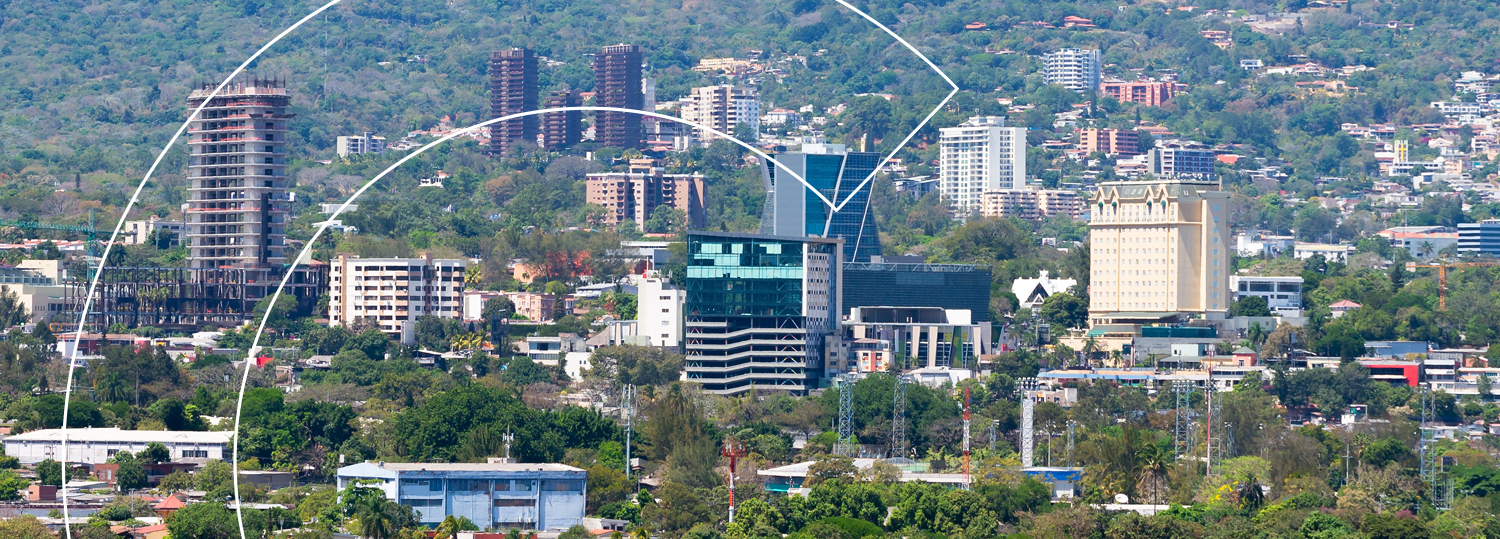The Land of Volcanos, as it is known worldwide, El Salvador e-market is been registering an increase in the past few years, and not even the Covid-19 pandemic will stop it from expand.
A brief overview of the country
El Salvador is located at the Pacific coast of Central America, sharing borders with Guatemala, Honduras and Nicaragua. El Salvador’s official language is Spanish, and its capital is San Salvador, a beta global city considered to be an important Central American financial hub.
San Salvador has been host to several Latin American and international political, social and sports events, and both the Sistema de la Integración Centroamericana (Central American Integration System) and the Banco Centroamericano de Integración Económica (Central American Bank of Economic Integration) have its headquarters here.
Demographics
El Salvador is the most densely populated state of the American continent, having a huge gap between the percentage of rural and urban population. For the past few years, El Salvador’s population is been registering a slightly increase: 6.582 million inhabitants in 2017, 6.643 million in 2018, and 6.704 million in 2019. The International Monetary Fund (IMF) forecasts that by 2024 El Salvador’s total population will reach 7.021 million inhabitants.
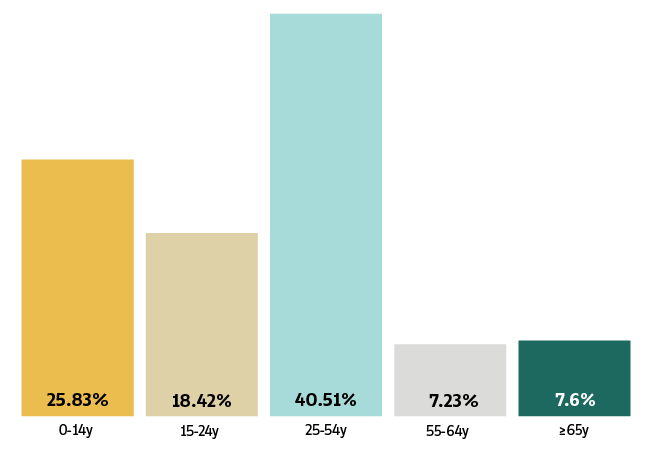
Due to 13 years of civil war, between 1979 and 1992, and the economic recession of the following years, as well as natural catastrophes (hurricanes and earthquakes), many Salvadorans left the country and emigrated to neighbouring countries, such as Honduras, Guatemala and Mexico, and to the USA. As a result, at least 20% of the population lives abroad.
Economy
The emigrant population has a very strong role in El Salvador’s economy, as the remittances they send home account for 21% of the country’s GDP ( it amount to USD 5.6 billion in 2019). In fact, these are the second largest source of external income, after exports.
The country’s total exports amounted to USD 5.76 billion in 2017, USD 5.9 billion in 2018, and USD 5.94 billion in 2019. As for imports, they amounted to USD 10.57 billion in 2017, USD 11.82 billion in 2018, and USD 12.01 billion in 2019.
Despite the importance of remittances in El Salvador’s economy, the services sector has still the biggest share of the country’s GDP:
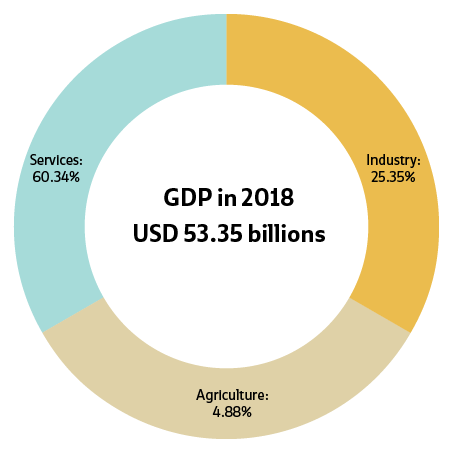

Approaching e-commerce in El Salvador
Compared to its region, in El Salvador e-commerce penetration is low, but it’s increasing by the years: 18.6% in 2017, 22.5% in 2018, and 28.2% in 2019. This increasing rate is expected be maintained in 2020, and 2021.
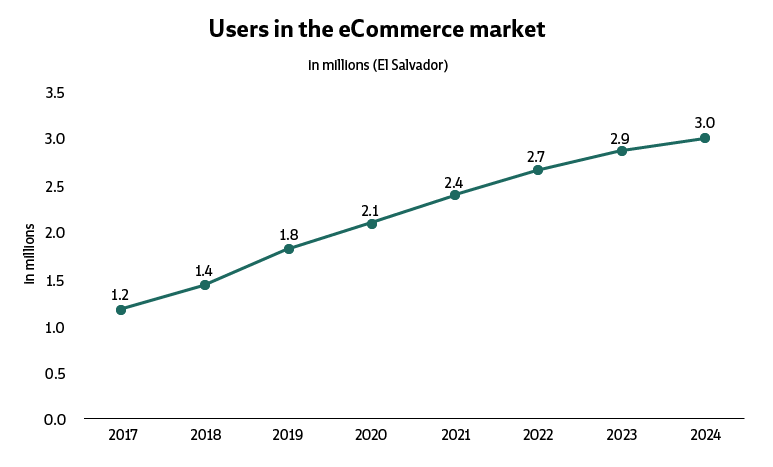
This means Salvadoran e-commerce is experiencing a growth above average. Revenues in e-market amounted to USD 132 million in 2017, UDS 187 million in 2018, and UDS 260 million in 2019.
Fashion tops the rank of items, followed by electronics and media, toys/hobby/DIY, furniture and appliances, and food and beverage.
Despite the Covid-19 pandemic, the project revenues for 2020 amount to UDS 363 million, and to UDS 453 million in 2021
A quick consumer profile
Salvadoran people are still sceptical to buy online, they prefer to pay in cash and enjoy personal interaction. But, the average revenue per user is increasing, which is a good indicator. The young adults and adults are those who shop online the most:
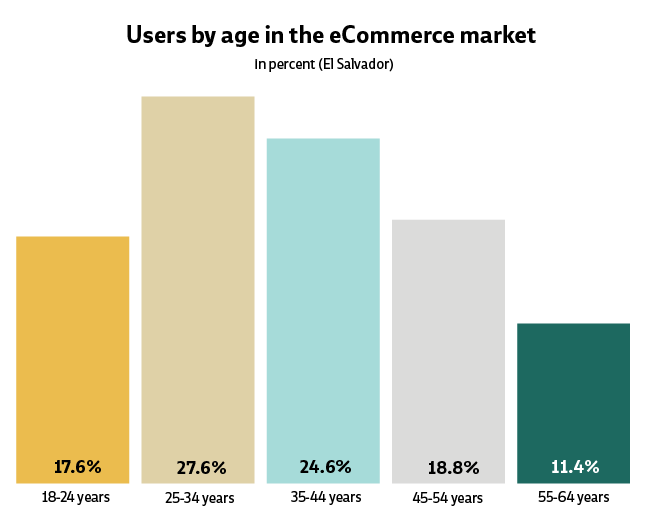
The major driver of e-commerce growth in El Salvador (as in the rest of Latin America) has been the increasing mobile phone usage and the rise of mobile payments – a large share of the population is unbanked, and only 5.66% of Salvadorans owns a credit card.
Therefore, alternative payment methods play a key role in El Salvador’s e-market. Indeed, e-wallets, such as PayPal, are popular among Salvadorans. Asides this, they pay for their online shopping in cash/deposit, and credit/debit cards.
Doing business in El Salvador? Partner with BoaCompra
In El Salvador, the indicators show the growth potential of e-commerce. However, some obstacles need to be overcome, such as consumer skepticism and financial exclusion that lead to local, alternative payment methods. Therefore, whether you a local entrepreneur/company or an international merchant, it’s crucial to adopt alternative payment methods.
BoaCompra is a payment solution expert and provider with more than 15 years of expertise in helping companies grow and sustain their business, giving access to local payment methods. Get in touch with us and learn more:

